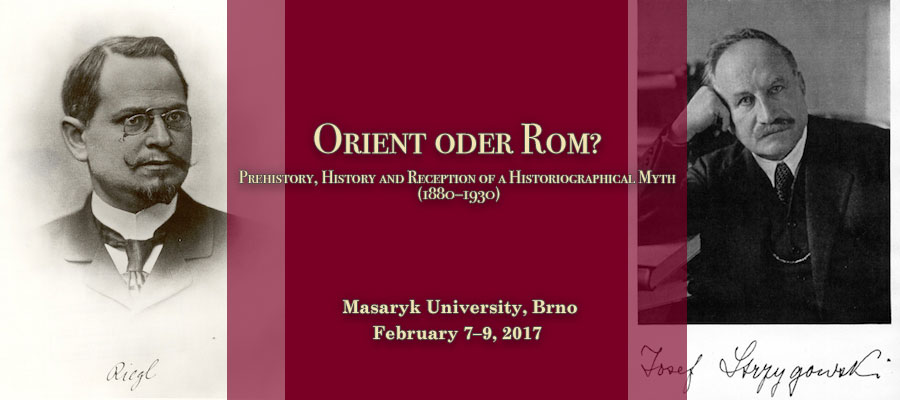Orient oder Rom? Prehistory, History and Reception of a Historiographical Myth (1880–1930), Centre for Early Medieval Studies, Masaryk University, Brno, Czech Republic, February 7–9, 2017
Today the question "Orient oder Rom?" is no longer a topical issue in medieval art history, although a persuasive answer has never been formulated. One of the reasons for this oblivion deals with the controversial figure of Josef Strzygowski, who in 1901 published about the question his pivotal volume and nowadays discredited for its racial and proto-nazi judgement. However, the question "Orient oder Rom?" concerns not only with Josef Strzygowski: the prodromes of this critical concepts goes back to the nineteenth century, when the Russian, Austro-Hungarian and Ottoman empires fought to control contested territories, and humanities studies mirrored these conflicts.
The conference aims to distance from the sole Strzygowski's perspective and to comprehend and rewrite the story of a pivotal concept for both art historiography and cultural identity. The goal of such reflection deals with three different moments: (I) the prehistory of the question "Orient oder Rom?" according to the nineteenth-century studies in the Russian, Austro-Hungarian and even in the Ottoman empires, where art history coincided with political aspiration; (II) the Vienna experience and the dialectical clash between Alois Riegl's and Franz Wickhoff's school against Josef Strzygowski, and its repercussions worldwide; (III) the longue durée, or how the lumbering figure of Strzygowski determined the critical misfortune of the question during the 1920s and the 1930s, until the postwar period.
Participants are invited to reflect on such issues as:
- the manner in which the question "Orient oder Rom?" was used in local context and especially in the long run;
- the scholars who discussed and faced this critical point; the impact of "Orient oder Rom?" in the study of monuments and art objects;
- the political use of the historiographical concept.
Papers from a diachronic art historical perspective are especially welcome.
Organizers
Ivan Foletti, Universities of Brno and Lausanne
Francesco Lovino, Institute of Art History, Academy of Sciences of the Czech Republic
The organization will provide accommodations for all participants; additionally, partial funding is available to support travel expenses.
